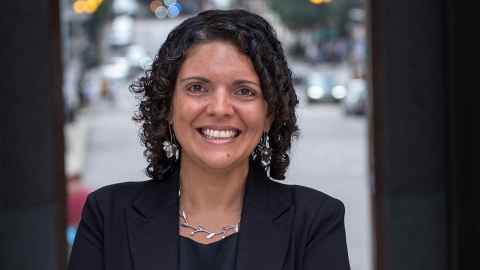Language: the most powerful tool for social justice
5 December 2022
Who's been hurt, what are their needs and whose obligations are they? Professor Mariana Souto-Manning, president of the Erikson Institute, Chicago asked her audience to consider questions of justice and belonging in the classroom during a recent talk at Epsom Campus.

A guest of the Centre for Global Childhoods at the Faculty of Education and Social Work and former Chair at Colombia University, Professor Souto-Manning laid out the reality for young children whose belonging is questioned when compared to those “whose belonging is ensured”.
“Belonging is political. Racialised [a term which refers to the social construction of race to create inequality and ‘otherness’] children are routinely denied belonging.”
She looked as far back as American physician Samuel Morton’s 1839 conclusion that based on his ‘research’ on the relative size of human skulls, Europeans were intellectually superior to all other races. Morton placed Africans at the very bottom of the scale and many used his views as justification for the continued existence of slavery.
Coming into the 20th century, she noted the famous Clark and Clark ‘doll test’ (1947), a US psychological experiment in which African American children were asked how they felt about two white dolls and two black dolls.
The majority of the 253 children aged three to seven assigned positive characteristics to the white dolls as opposed to the black, exposing internalised racism and self-hatred that was more acute among children attending segregated schools.
Our interactional norms and conventions of politeness favour whiteness and we have devalued oral communication and overprivileged written texts.
Professor Souto-Manning made the point that society often enacts harm, in pursuit of justice, by adhering to English common law which inherently protects white privilege.
“So how as teachers can we suspend harm if we are serious about justice? We’re all part of the community and answerable so we have a role to play in putting right wrongs and addressing harms and causes.”
Language, she said, is the most powerful tool for social justice. She referred to a particular type of anti-Black linguistic racism in the US context that actively discourages Black ways of speaking in favour of non-Black.
“Who gets to set the standards? Our interactional norms and conventions of politeness favour whiteness and we have devalued oral communication and overprivileged written texts.”
She told the story of her son’s primary school teacher who asked him, “If he’d like to clean up” after class, and how he'd simply answered, "No".
“We had a discussion about that at home and I made the point that he was being rude and when the teacher asked him the next time he said, ‘No thank you!' At home, if I want my son to do something I simply say ‘go and do it’ and he gets the message. That’s an example of a different linguistic style at home and in class.”
So how as teachers can we suspend harm if we are serious about justice? We’re all part of the community and answerable so we have a role to play in putting right wrongs and addressing harms and causes.
She says teachers always have to ask themselves, ‘Who’s power is being centred?’
“Racialised identities are under siege, they often feel pressure to undergo processes of erasure and are made to choose between how things are done at home and in their community, as opposed to at school.”
We need a paradigm shift, she said, from ‘diversity and inclusion’ to ‘justice and belonging’ and gave a few examples of how they could be put into practice in the classroom by doing something as simple as making sure everyone’s names are pronounced correctly.
As starting points, she mentioned Your Name is a Song by Jamilah Thompkins Bigelow and Let’s Talk About Race by Julius Lester as useful resources.
Professor Souto-Manning also suggested taking an approach in our everyday lives that focuses on ‘micro-affirmations’ as opposed to ‘micro-aggressions’.
“An example of a micro-aggression might be the person who asks [a person of a non-white ethnicity] ‘Where are you from?’ and when they say, ‘New York’ or ‘Auckland’, they then say, ‘But where are you really from?’”
Other situations she’s personally experienced include being questioned about her seat location by another passenger as she’s heading to business class, being mistaken for a babysitter on her own college campus and being mistaken for an assistant by someone actually coming to see her as a professor.
On the contrary, micro-affirmations, she said, are based on “dignity, integrity and justice” and "value the voices and expertise of Black, Indigenous and People of Color (BIPOC)" in and outside the classroom.
Media contact
Julianne Evans | Media adviser
M: 027 562 5868
E: julianne.evans@auckland.ac.nz